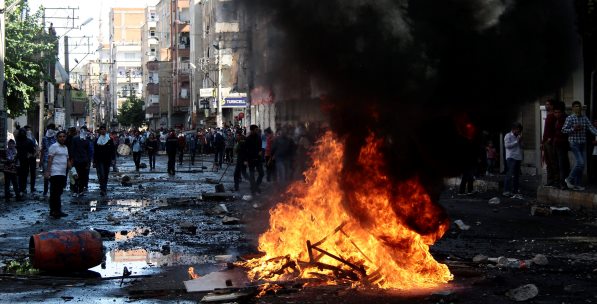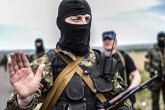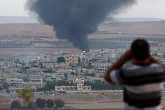The Islamic State of Iraq and al-Sham (ISIS), as the most serious threat to the Middle East’s established order, has begun to escalate its control of the region despite the U.S.-led international coalition’s airstrikes. ISIS’s latest attack is targeting the city of Kobani – Ayn al-Arab in Arabic – where the PKK-affiliated Democratic Union Party (PYD) has held control for two years. The city has been under siege for three weeks and, apparently, ISIS seems very close to overtaking the city. This advance triggered another development in Turkey. Immediately after ISIS began attacking Kobani, PKK leaders and the pro-Kurdish opposition Peoples’ Democratic Party (HDP) started to accuse the Justice and Development Party (AK Party) government of backing ISIS. When it was understood that it was no longer possible to hold the city, the HDP and PKK demanded their supporters to turn each city to Kobani in Turkey. The leader of the PKK’s People’s Protection Forces (HPG), Murat Karayılan, said, “If Kobani is in the firing line, our people in Turkey must be hard in the way of feeling the fire. They must take a risk.” The ongoing reconciliation process in which the government is negotiating with PKK leader Abdullah Öcalan while he is serving a life sentence in prison and the HDP in good faith seems to be in danger. After severe clashes with police, five citizens died and the government declared curfew in the five biggest cities in the Kurdish region including Diyarbakır and Mardin.
THE WAY OF ISIS TO KOBANI
The very dynamics that gave birth to ISIS and its rise are still present in the region. After 2003, U.S. policy over a decade caused a sharp ethnic (Arab-Kurdish) and sectarian (Sunni-Shiite) polarization. The former Prime Minister Nouri al-Maliki’s Shiite-dominated government in Iraq marginalized the Sunni bloc and ISIS benefited from this power vacuum first in Syria and then in Iraq. In this regard, ISIS should be considered as the outcome of the aggression committed by the Iranian-backed sectarian Iraqi government. When the central governments in both Iraq and Syria weakened, ISIS cooperated with local Sunni tribes and increased its influence at a terrifying speed.
One of the main strategies of this organization is to capture territories where there is a power vacuum. They first showed themselves in northern Syria and started their infamous march by invading Iraqi cities one by one. Although they attempted to reach Baghdad, a serious confrontation from Shiite militias stopped them. Then they changed their direction and started to march over Kurdish territories in Iraq and Syria. When ISIS advanced very close to Irbil, the capital of the Iraqi Kurdistan Regional Government (KRG), U.S. airstrikes stopped their advance. Finally, ISIS determined Kobani as the new target in northern Syria in order to maintain their supremacy in the region. Although ISIS was considered one of the groups fighting with the Syrian regime forces, there is not much evidence proving that the group fought against President Bashar Assad. Rather, they concentrated to impose their dominance in the territories they captured or aim to capture. In this regard, it has to be answered why ISIS has been attacking the city of Kobani.
Strategically, ISIS seized the geographical area between Iraqi Kurdistan and the Syrian Kurdish region in order to prevent the KRG’s possible military and humanitarian assistance for Syrian Kurds. Also, the People’s Protection Units (YPG), the military arm of the PYD, signed a cooperation agreement with the Free Syrian Army (FSA) in March 2014 and even held joint operations against regime forces in Aleppo. Turkey had started to push the PYD to increase the level of this coalition as well. ISIS realized the potential danger and intended to deplete this coalition before it turned out to be a threat to them. Kobani, located in the middle of the three Syrian Kurdish cantons that were declared by the PYD in 2013, serves as a bridge between the two cantons. ISIS taking Kobani would break the link between the o
In this article
- Foreign Policy
- Opinion
- 2003
- 2013
- 2014
- Aleppo
- Assad Regime
- Bashar Al Assad
- DAESH
- Democratic Union Party (PYD)
- Free Syrian Army
- Free Syrian Army (FSA)
- Humanitarian Assistance
- Iraq
- ISIS
- Islam
- Islamic
- Islamic Republic of Iran
- Kobane
- Kobani
- Kurdish Political Movements
- Kurdish Region
- Kurdistan Regional Government (KRG)
- Kurdistan Workers' Party Terrorist Organization (PKK)
- Middle East
- Opposition
- People's Protection Units (YPG)
- PKK - YPG - SDF - PYD - YPJ - SDG - HBDH - HPG - KCK - PJAK - TAK - YBŞ
- Prime Minister
- Reconciliation Process
- Sunni
- Syria
- Syrian Civil War
- Syrian Conflict
- Syrian Crisis
- Syrian Regime
- Terror
- Türkiye's Justice and Development Party | AK Party (AK Parti)
- Türkiye's Peoples' Democratic Party (HDP)
- United States (US)



